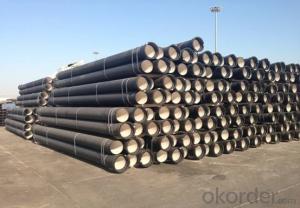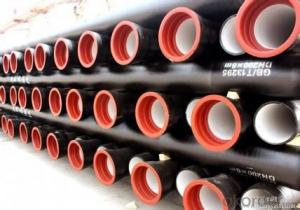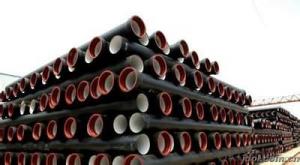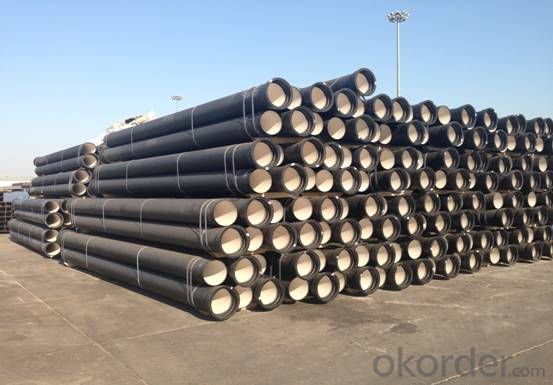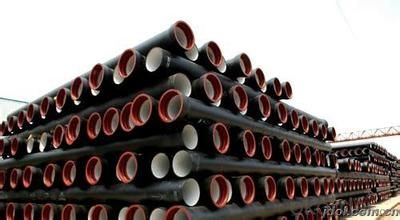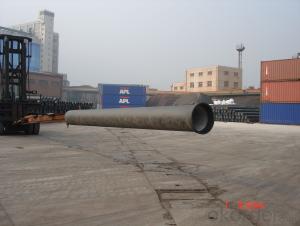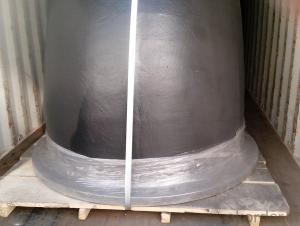DUCTILE IRON PIPE C Class DN1400
- Loading Port:
- China Main Port
- Payment Terms:
- TT OR LC
- Min Order Qty:
- -
- Supply Capability:
- -
OKorder Service Pledge
OKorder Financial Service
You Might Also Like
Ductile Iron Cast Pipe is without any defects compare with tradition casting tech, which has many advantages particularly as follow:
(1) High density. In the "vertical upward casting" process, the melt iron of centre liquid column in center crystallizer is continuously feeding for volume shrinkage caused by condensation tube at outer circumference , which lead to be free of shrinkage porosity.
(2) High purity. When melt iron pouring, the mixed impurities such as gas, dross, sand grain which are lighter than melt iron could be eliminated at furnace mouth, its impossible to enter into the crystallizer through the channel, so the melt iron into the crystallizer is very pure.
(3) Strength with toughness. The cooling speed provided by continuous crystallizer is 30 times than sand casting and 5 times than centrifugal casting, and doesn't produce white iron, the eutectic cell volume of continuous cast iron is one eighth to one tenth compare with traditional cast iron. The density of graphite nodule in ductile iron can reach 300-700 pcs/mm2. Therefore, all reason above improve the strength and toughness of continuous cast iron.
(4) Free machining. The high speed cooling make the hardening phase (such as boride, steadite) not appear like reticular, massive or thick, but diffuse like fish bone and pane in shape, moreover, there are tiny graphite flakes inlaid hardening phase. It's free machining in BrinellHardness the range of 250-300HB. However, the Brinell Hardness of 250 is top limit to common metal materials.
(5) Uniform composition of tube wall. The convection mixing of liquid column caused by marching type drawing in crystallizer make the composition of tube wall well-distributed, and concentration gradient very little.
(6) High productivity. To the wall thickness of tube under 10mm, the speed of continuous casting is 1 meter/min, to the wall thickness of tube under 20mm, the speed of continuous casting is 0.5 meter/min, which is high efficiency that centrifugal or other casting tech couldn't reach.
- Q: Ductile cast iron can replace copper sleeve
- Under dry friction conditions, we design a pre - formed synovial membrane on the surface of the bearing to ensure that the solid lubricant is transferred to the dual parts in the shortest possible time, and an effective solid lubricant film is formed
- Q: What new technologies are there for the installation of ductile iron pipes?
- At present, the international general no faucet pipe hoop straight pipe and fittings (i.e. new flexible joint cast iron drainage pipes and fittings of the thesis), according to the interface type is divided into A type flexible interface (flange gland connection) and type W (flexible interface coupling connection) two, referred to as A type and W type.1.1 new flexible joint cast iron drainage pipe by centrifugal casting technology, has a compact structure, pipe wall thickness, the outer wall is smooth, no trachoma and slag, the tensile strength and compressive strength are high, products with stable chemical composition, corrosion resistance, fire retardant non-toxic, comply with fire safety requirements of environmental protection, no noise, no deformation, life. Long use.Type 1.2A: type A tube with high strength, low noise, good fireproof performance, long service life, with the advantages of flexibility and good seismic performance, but in the actual project that socket joints need larger installation space and the tube body is heavy, consumption of steel, especially in high-rise buildings it is difficult to accept by construction.
- Q: Are ductile iron pipes suitable for use in cold climates?
- Yes, ductile iron pipes are suitable for use in cold climates. Ductile iron is known for its excellent strength and durability, making it a reliable choice for various applications, including water supply systems, sewage systems, and industrial piping. In cold climates, where temperatures can drop below freezing, ductile iron pipes are highly resistant to cracking or breaking due to their unique metallurgical composition and structure. They have a high tensile strength and can withstand the expansion and contraction caused by freezing and thawing cycles. Additionally, ductile iron pipes have a smooth internal surface that helps prevent the buildup of ice or sediment, ensuring efficient flow and minimizing the risk of blockages. Overall, ductile iron pipes are a suitable and dependable option for use in cold climates.
- Q: How do ductile iron pipes compare to PVC pipes in terms of strength?
- Ductile iron pipes are generally considered to be stronger than PVC pipes. Ductile iron is a type of cast iron that has been treated with trace amounts of magnesium to give it enhanced strength, flexibility, and ductility. This makes ductile iron pipes highly resistant to cracking and breaking under pressure, making them suitable for a wide range of applications including water and wastewater transportation. On the other hand, PVC pipes are made from a type of plastic called polyvinyl chloride. While PVC pipes are relatively strong and durable, they are not as strong as ductile iron pipes. PVC pipes are more prone to cracking and breaking under high pressure or when exposed to extreme temperature fluctuations. They are often used for low-pressure applications such as irrigation and drainage systems. In terms of strength, ductile iron pipes have a higher tensile strength and can withstand higher internal and external pressures compared to PVC pipes. Ductile iron pipes also have a higher impact resistance, making them less susceptible to damage from external forces such as heavy machinery or accidental impacts. However, it is important to note that the choice between ductile iron and PVC pipes ultimately depends on the specific requirements of the project. Factors such as cost, installation ease, corrosion resistance, and the nature of the fluid being transported should all be considered when deciding between these two materials.
- Q: Can ductile iron pipe be used for industrial process piping?
- Indeed, industrial process piping can make use of ductile iron pipe. Renowned for its robustness, longevity, and ability to withstand corrosion, ductile iron pipe proves itself as an appropriate selection for diverse industrial functions. It boasts the capability to manage high-pressure systems and commonly finds application in sectors like water and wastewater treatment, oil and gas, chemical processing, and power generation. Moreover, ductile iron pipe offers ease of installation and an extensive lifespan, thus rendering it a cost-efficient choice for industrial process piping.
- Q: What is the expected pressure rating for ductile iron pipes?
- The pressure rating for ductile iron pipes can differ based on factors like pipe diameter, wall thickness, and specific application. In general, ductile iron pipes are built to endure high-pressure situations. They are frequently utilized in water and wastewater systems, where they can normally manage pressures ranging from 150 psi to 350 psi or more. To ensure safe and dependable operation, it is crucial to refer to the manufacturer's specifications or relevant industry standards for precise pressure ratings based on pipe size and application.
- Q: Can ductile iron pipe be used for oil and gas transmission pipelines?
- Yes, ductile iron pipe can be used for oil and gas transmission pipelines. Ductile iron pipe has many advantageous properties that make it suitable for such applications. It has a high tensile strength, which allows it to withstand the high pressures and stresses involved in oil and gas transmission. Additionally, ductile iron pipe has excellent corrosion resistance, making it highly resistant to the corrosive nature of oil and gas. This resistance is further enhanced by the use of protective coatings on the pipe's exterior. Ductile iron pipe is also known for its durability and longevity, ensuring the reliability and longevity of oil and gas transmission pipelines. Overall, the properties of ductile iron pipe make it a reliable and cost-effective option for use in oil and gas transmission pipelines.
- Q: Can centrifugal cast iron pipe be galvanized or coated with asphalt which is good for corrosion prevention?
- The centrifugal ductile iron pipe has the advantages of zinc coating and asphalt coating, and it is used in combination with two. By spraying zinc and epoxy coal tar coating of ductile iron pipe wall (or epoxy resin paint, polyurethane, etc.) wall using Portland cement (or epoxy powder, epoxy, polyurethane, ceramics etc.) wall coating can effectively active substances in soil and the formation of an insoluble zinc salt protection tube, the internal coating can inhibit corrosion of pipe body fluid medium.
- Q: Can ductile iron pipe be used for power plant cooling water systems?
- Yes, ductile iron pipe can be used for power plant cooling water systems. Ductile iron pipe is known for its high strength and durability, which makes it suitable for various applications, including cooling water systems in power plants. It has excellent corrosion resistance, making it resistant to the corrosive effects of water and chemicals commonly found in cooling water systems. Additionally, ductile iron pipe has a smooth interior surface that minimizes friction loss and allows for efficient water flow. These characteristics make ductile iron pipe a reliable and cost-effective choice for power plant cooling water systems.
- Q: Can ductile iron pipes be used in mining applications?
- Yes, ductile iron pipes can be used in mining applications. Ductile iron is known for its high strength and durability, making it suitable for use in demanding environments such as mines. These pipes have excellent resistance to corrosion, which is essential when dealing with water or other liquids that may contain chemicals or minerals. Additionally, ductile iron pipes have good impact resistance, making them capable of withstanding the rough conditions often found in mining operations. They are also easy to install and maintain, allowing for efficient and cost-effective use in mining applications. Overall, ductile iron pipes are a reliable choice for transporting water, slurry, or other substances in mining operations.
Send your message to us
DUCTILE IRON PIPE C Class DN1400
- Loading Port:
- China Main Port
- Payment Terms:
- TT OR LC
- Min Order Qty:
- -
- Supply Capability:
- -
OKorder Service Pledge
OKorder Financial Service
Similar products
Hot products
Hot Searches
Related keywords
